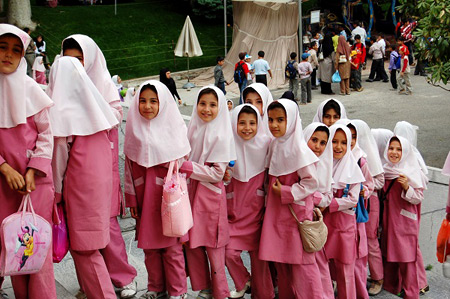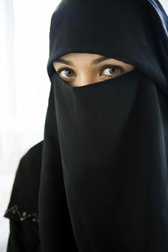|
European Court in landmark judgement:
France's ban on burqa upheld
The European Court of Human Rights on Tuesday this week in the matter
of SAS V Government of France (Case No.43835/2011) upheld France's ban
on wearing niqab or Burqa, full-face veils in public, rejecting
arguments that the ban undermines freedoms of religion and expression
and Muslim women's' rights.
|

School children clad in the hijad |
There was jubilation across Europe on hearing the historic Judgement
of the 17 judges of the court who took part in the deliberations. This
judgement put the matter to rest after three years of uncertainty. The
Court was very clear in its judgement and said there was no violation of
articles 8, 9 and 14 as alleged by the appellant.
The decision is a victory for the governments of France and Belgium,
which have passed laws prohibiting wearing niqabs in public or veils and
other garments that conceal the entire face, and gives other European
government's broader discretion to enact similar bans.
The French government said the three-year ban helped to protect
public safety, as well as women forced to wear face-covering garments,
but opponents have criticized it as anti-Muslim and discriminating
against religious minorities.
The French ban had been challenged by a young Muslim woman who said
she sometimes chooses to wear a niqab-a veil that leaves only her eyes
visible-or a burqa-a loose garment that covers her entire body with only
a mesh over her eyes.
The Parliament of France on 14 September 2010, passed legislations
resulting in the ban on the wearing of face-covering headgear, including
masks, helmets, balaclava, niqabs and other veils covering the face in
public places, except under specified circumstances. The ban also
applies to the burqa, a full-body covering, if it covers the face. The
bill had previously been passed by the National Assembly of France on 13
July 2010.
France has about five million Muslims - the largest Muslim minority
in Western Europe - but it is thought only about 2,000 women wear full
veils or burqa.
As President, Nicolas Sarkozy, whose administration brought in the
ban, said that veils oppress women and were "not welcome" in France.
Under the ban that took effect on 11 April 2011, no woman, French or
foreign, is able to leave their home with their face hidden behind a
veil without running the risk of a fine.
The key argument supporting this proposal is that face-coverings
prevent the clear identification of a person, which is both a security
risk, and a social hindrance within a society which relies on facial
recognition and expression in communication. The key argument against
the ban is that it encroaches on individual freedoms.
Anyone who contravenes the law is liable to a fine of 150 Euros.
A Muslim woman, who was born in France in 1990 and identified only as
S.A.S. in court documents, challenged the French legislation by way of a
right plea before ECHR supported by a British legal team claiming that
her rights as a Muslim has been infringed by the French Law and sought
to wear the niqab or burqa in public.
She further said that she wore the veils voluntarily, without any
pressure from her husband and family, and that they allowed her to
manifest her faith.
She argued the French ban violated her religious freedom and put her
at risk of discrimination and harassment.
|

A woman in a niqab |
France passed a law against concealing one's face in public spaces in
2010 and it came into effect the following spring. A few months later, a
similar prohibition came into force in Belgium. Citizens of the Ticino
canton in Switzerland voted in favour of such a ban in late 2013.
France argues that the veils are a security risk, since they conceal
a person's identity. In its arguments to the European court, the French
government also said that showing one's face in public was one of the
"minimum requirements of life in society."
The Strasbourg-based court ruled the general ban imposed by the
government wasn't justified on public-safety grounds, or to protect
women's rights. But it said France's aim of improving social cohesion
through the ban was legitimate.
"The court was...able to accept that the barrier raised against
others by a veil concealing the face was perceived by the respondent
state as breaching the right of others to live in a space of
socialization which made living together easier," it said.
Civil and human-rights groups swiftly rejected the ruling, which
can't be appealed. "Coming at a time when hostility to ethnic and
religious minorities is on the rise in many parts of Europe, the court's
decision is an unfortunate missed opportunity to reaffirm the importance
of equal treatment for all and the fundamental right to religious belief
and expression," said James
A. Goldston, executive director of the Open Society Justice
Initiative, which filed a third-party intervention in the case. "The
majority has failed adequately to protect the rights of many women who
wish to express themselves by what they wear."
Although the French law affects only a tiny minority of the country's
5 million Muslims; it has increased tensions across Europe as all
European countries will now follow the suit.
- Asian Tribune - |

